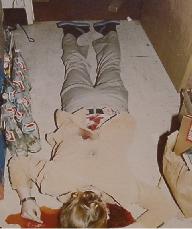 Image © 2005 AP via DrudgeReport, 'fair use'
Image © 2005 AP via DrudgeReport, 'fair use'
Who among us isn't looking at the
cataclysm that New Orleans has become, and hasn't wondered what things would be like in their neck of the woods should a similar catastrophe strike? Sure... not everyone lives in areas prone to hurricanes, but Nature has a veritable smorgasborg of disasters on an epic scale from earthquakes to tsunamis, volcanic eruptions to massive meteor strikes. Science fiction writers have made millions writing about the death and destruction that would ensue from such calamities and the ensuing chaotic aftermath. And then there's disasters of the man-made variety: epidemic, war and its aftermath, or terrorist attack.
The aftermath of Hurricane Katrina has been like a disaster novel come alive. Fierce winds pummeled the Gulf Coast and left widepread destruction. A tremendous storm surge washed away buildings and roadways, altering the topology perhaps permanently. Most of us thought that, on the day after Katrina passed northward, God or fate or call it what you will had once again spared New Orleans, and that the worst case had not happened. We were wrong: New Orleans dodged one bullet but she relaxed too soon, only to run smack into the followup shot when the levees failed and the city slowly yet inexorably flooded.
Is your community ready for a similar disaster? Are you ready for a similar disaster? What does "being ready" mean? It means that your household is ready to survive for a minimum of seven days in complete isolation from society, without the availability of utilities such as electricity, phone, and natural gas, without access to grocery stores or pharmacies, as if your household were transported to a deserted island.
• Being ready means stockpiling sufficient food and water for your household to last seven days
At a bare minimum, you should have one-half gallon of drinking water per person per day (that means 3.5 gallons per person for seven days of sufficiency). This water will be used for drinking only, not washing or cleaning. An easy way to obtain a water supply is to thoroughly clean your used one-gallon plastic milk containers as your family normally consumes the milk inside, and fill them with tap water. Do this for a few weeks until you have enough water stockpiled. Once you have sufficient water stockpiled, empty and refill one gallon every week as you rotate through the stockpiled water, ensuring that the water remains fresh. Additionally, keep pure chlorine bleach on hand as an expedient way of purifying water (16 drops of chlorine bleach per gallon should be sufficient to purify filtered water) as well as a water purification system although remember that these are adjuncts to, and not substitutes for, stockpiled water. Note that one-half gallon a day will lead to eventual dehydration under severe conditions, so you might want to stockpile even more water.
Military MREs make good survival food; they come in environmentally-resistant packaging, they contain balanced, nutritious meals that have enough calories to sustain moderate to intense physical activity, and they can be eaten as-is and are provided with a means of heating them. No, they are not gourmet meals and yes, under normal conditions you will tire of them... but in an emergency you will devour them with gusto. MREs are bulky, but are fairly inexpensive and excellent for a limited duration stockpile that will be used to get your household past a short-term crisis of a week or two. I recommend that you stock a minimum of two MREs (2400-2600 calories total) per person per day for seven days (you can always eat less to prolong your food supply if necessary). Google the Web to find vendors.
Don't forget necessary prescription meds. A good, stocked first-aid kit is also a necessity.
• Being ready means stockpiling sufficient simple utilitarian tools and equipment to facilitate your survival
Anyone who camps should have items such as tents, sleeping bags, backpacks, sturdy boots, and portable stoves that greatly facilitate surviving under extreme conditions. If you don't camp, you should consider buying such items and trying them out by camping out (in your backyard, at least). I guarantee that those folks who are still in New Orleans and who have tents and camp stoves and fuel are a lot better off than those who don't.
If you live in a flood-prone area, then common sense indicates that you may be trapped in, or on, your house. Having some common tools, like a hatchet, a crowbar, and a hammer, could mean the difference between drowning in your attic or escaping. A folding shovel is an exceptionally useful item to keep in your vehicle (here's my favorite). It can save your life.
You also need flashlights with sufficient batteries to last for at least a week of several hours-per-day usage. Consider obtaining rechargeable batteries and a source of power (such as a generator), and perhaps contacting an electrician to install a cut-out circuit that will allow you to power several circuits in your house from that generator while isolating your residence from the power grid (so your generator doesn't waste fuel attempting to power the neighborhood or endanger utility crews). Consider also alternate means of power generation (such as a solar cell) or getting a recharger that can utilize a car's 12-volt electrical system that can be used to recharge batteries.
Dry storage for supplies is also important. I have many large Rubbermaid containers that I store camping gear in, that I grab for my camping and hunting trips. Each container is labeled so I know what is where, and I keep them stocked. In an emergency, I can grab a couple of these containers, bungee the lids closed, and toss them in the back of my pickup truck knowing that I have everything I need to survive living outdoors. I keep a couple of extras around that we store blankets in, to be used to store clothing (heavy jackets, extra trousers, shirts, socks, footware, etc.) and MREs in case we have to quickly leave our house. You know what? These float, too, meaning you can tow them behind you with little effort if you have to traverse a flooded area.
• Being ready means acquiring sufficient weapons and training to defend yourself from those who would steal your stockpile or otherwise do you harm
If you don't own firearms, then make the decision today to learn how to handle and use them safely and effectively... and buy a gun. If you truly believe that the government will always be able to protect you, and that ownership of weapons is a sign of sexual inadequacy, please save my bandwidth for more intelligent readers and skip reading the rest of this because your stupidity has condemned you to be one of the first victims of post-disaster anarchy.
If you're still reading, then there's hope for you. All responsible law-abiding adults in your household should have at least one handgun, in a caliber and configuration suitable for self-defense (4" .38 Special revolver or 9mm pistol minimum), and should have had the minimum training necessary to be able to pass your local police qualification course. Additionally, your family should have at least one defensive rifle (16" AR-15 or Mini-14 or lever-action rifle in .357 Magnum, minimum) for every two adults (better to have one for each adult, and they should be identical) with a 'basic load' of magazines and ammo (210-300 rounds loaded in magazines if appropriate) and every adult should know how to load, fire, and maintain these rifles, and be able to hit a basketball-sized target at 50 yards at a minimum.
Firearms are useless without ammunition. Obtain at least 300 rounds of ammunition for each firearm and at least four spare magazines per firearm (for those firearms that take detachable magazines). Obtain cleaning kits for each firearm as well and keep them stocked. A gun that won't fire due to inadequate maintenance is useless.
Chances are, you'll never need these weapons. Good. If disaster strikes, and looters see that you can defend yourselves, chances are they'll bypass your household and look for those readers who skipped this section. If worse comes to worse, you'll most likely prevail... and if you don't then you are no worse off than if you never owned a gun in the first place.
• Being ready means possessing sufficient means of communication to enable your household to stay in contact if neighborhood separation becomes necessary, and to communicate to areas outside the disaster area, without having to rely on the public communications infrastructure
Cell phones are modern miracles of technology... that invariably fail when disasters hit. You can't rely on them in an emergency. Get a Technician-class amateur radio license ASAP and upgrade from Tech to General-class as soon as possible. The Technician license lets you own and operate two-way radios that transmit on frequencies above 30 Mhz which are excellent for local and regional communication. The General license lets you operate in the HF bands (1.8 to 30 Mhz) where you can communicate around the world on as little as 5 watts of transmitted power. Contact the ARRL for more information on amateur radio in the US.
Once you get your Tech license, get a 5-watt handi-talkie (HT) that can be opened to operate outside the amateur radio bands, and open it. Do not operate outside the ham radio bands unless and until you are in a true emergency where you need to communicate in order to save lives or property from damage and have no other means of communication. Your HT should also have scanning and monitoring capabilities so you can listen to AM or FM radio, emergency Public Service frequencies, and National Weather Service broadcasts.
Get enough FRS walkie-talkies for everyone in your household. Get everyone in your household familiar with using the FRS radios, and their shortcomings. In an emergency, your 'opened' amateur radio HT will be able to communicate with your (and others') FRS walkie-talkies, you will be able to stay in touch with everyone via FRS radios and frequencies, and you can use your HTs to obtain news and valuable information and to contact the authorities to arrange for rescue.
Make auxiliary battery packs for your HTs that can utilize common, inexpensive 12-volt gel cell batteries. Unlike a $40+ factory battery pack, which only lasts a couple of hours, your homemade pack will cost under $20 and last for a couple of days.
After you obtain your General license, get a portable HF transceiver and make your own antenna out of wire. This small setup will allow you to communicate outside the region, if necessary, to arrange for help or to share information. If Tom Hanks had packed one of these in his briefcase he never would have spent four years on a desert island and lost Helen Hunt to an ex-"Law and Order" detective cum dentist.
• Being ready means possessing a viable means of transporting your household out of the disaster area if, and when, you determine that leaving your current location is necessary to ensure your survival
Everyone mocks SUVs, but the best vehicle for emergency travel is a big honkin' SUV with four-wheel drive. You can tow a trailer behind it... or rescue someone else's car. You can haul all of your stockpiled food, water, supplies, and weapons, as well as your entire household. You can cross damaged roadways, traverse minor flooded areas, ram your way through looter roadblocks, and withstand gunfire better than with just about any other vehicle. If you live in a city like New Orleans and you know a flood is coming (say, the news alerts you to a levee breach), then load up the SUV and head to a highway overpass. Set up your tent outside, establish watches, and be ready to flee the area when the waters subside.
If you live in flood-prone areas, such as river flood planes or, say, cities that are below mean sea level, perhaps a small johnboat or canoe might be a good idea... but only if you can store it at your house and where it won't be destroyed or rushed away by strong winds or flash floods.
Whatever vehicle you have, keep at least a half-tank of gas in it at all times. Most natural disasters strike without warning, and you will not be able to pump gas from underground tanks when the power is out.
• Being ready means not waiting until the last minute
Don't wait until a couple days before a major hurricane is predicted to wipe out your city before starting to prepare. If the National Hurricane Center starts issuing press releases with words like "horrible" and "devastating" don't wait for your mayor to give the word. The majority of Orleaneans didn't wait for Mayor Nagin and his belated call for a mandatory evacuation; they listened to the urgent warnings from the National Hurricane Center and got out of Dodge before Katrina struck. Some might have felt a little silly on Tuesday morning, when the aftereffects of Katrina didn't seem too bad... just a little wind damage. I'm sure they feel a lot better now about their decision. They're alive.
---------------------
Watching Katrina approach, and then overwhelm New Orleans and south Louisiana, where I went to high school and college and lived for more than a decade, has been particularly disturbing. As of today I still cannot contact many friends who live in the affected area, and my thoughts and prayers are with them. I am saddened and disgusted by the dregs of society who are taking advantage of the situation to wreak havoc on the city and its innocents, and I am heartened and encouraged by the numerous acts of courage and compassion by those in the maelstrom that is New Orleans, and by those outside who are expending considerable time and energy (and money) to help save the people of Louisiana, Mississippi, and Alabama who have been so devastated by this storm and its aftermath. Please, donate to the organizations that are rushing to help. My suggestions: The Salvation Army, The American Red Cross, and Mercy Corps.
You can learn more about the Blog for Relief Day at Instapundit. Michelle Malkin also has information about how more than just New Orleans has been affected. And, Brendan Loy has done an outstanding job of Katrina-blogging; his sentiments on the performance of the city's leadership echo mine exactly.
Update: Ed at Captain's Quarters has a post on how the primary responsibility for disaster planning lies with local governments. I would (and have) extended that line of thinking: the primary responsibility for disaster planning lies with each of us (as described above).






